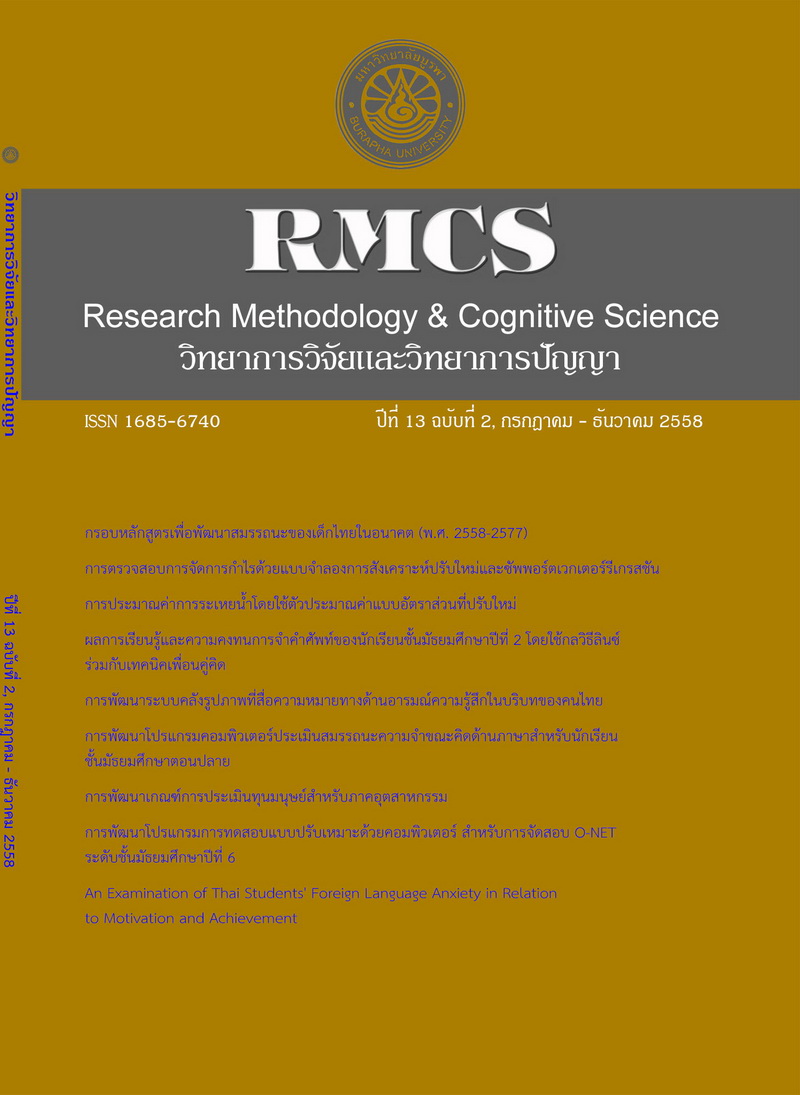An Examination of Thai Students' Foreign Language Anxiety in Relation to Motivation and Achievement
Main Article Content
Abstract
วัตถุประสงค์ของประชาคมเศรษฐกิจอาเซียน (Asean Economic Community: AEC) คือการสร้างตลาด เดียวขึ้นในเอเซียตะวันออกเฉียงใต้ ด้วยเหตุนี้ประเทศไทยจึงเผชิญกับงานที่ท้าทายในการส่งเสริมให้ประชาชนเพิ่ม ความสามารถด้านภาษาอังกฤษ งานวิจัยที่ศึกษาเกี่ยวกับความวิตกกังวลด้านภาษาต่างประเทศชี้ให้เห็นว่า การพูด ภาษาอังกฤษเป็นปัญหาในวัฒนธรรมไทย การวิจัยนี้ศึกษากลุ่มตัวอย่างจํานวน 1,000 คน เป็นนักศึกษาจาก มหาวิทยาลัย 5 แห่ง มีจุดมุ่งหมายเพื่อศึกษาผลกระทบของความวิตกกังวลด้านภาษาต่างประเทศต่อระดับแรงจูงใจ และผลสัมฤทธิ์ทางการเรียน รวมทั้งให้ข้อเสนอแนะสําหรับการปรับปรุง ความวิตกกังวลด้านการสื่อสารวัดโดยใช้มาตรวัดความวิตกกังวลด้านภาษาต่างประเทศ (Horwitz, Horwitz, & Cope, 1986)
ความวิตกกังวลด้านการเขียนวัดโดยใช้มาตรวัดความวิตกกังวลด้านการเขียนภาษาที่สอง (SLWAI) (Cheng, 2004) และมาตรวัดแรงจูงใจทางวิชาการปรับปรุงจากมาตรวัดของ Robert, Vallerand, Pelletier et al. (1993)
การวิเคราะห์ข้อมูลใช้สถิติบรรยายและสถิติอ้างอิงและใช้โมเดลสมการโครงสร้างในการทดสอบโมเดลที่ เสนอและสมมติฐาน 3 ข้อ ผลปรากฏว่า สมมติฐานที่ 1 สอดคล้องกับข้อมูลเชิงประจักษ์บางส่วน เนื่องจากสมมติฐาน 1b ความวิตกกังวลด้านภาษาต่างประเทศนอกชั้นเรียนพบว่า มีความสัมพันธ์ทางลบกับแรงจูงใจภายใน ในขณะที่ สมมติฐาน 1a ความวิตกกังวลด้านภาษาต่างประเทศในชั้นเรียนพบว่า ไม่มีความสัมพันธ์กับแรงจูงใจภายใน สมมติฐาน ที่ 2a และ 2b ไม่สอดคล้องกับข้อมูล เนื่องจากความวิตกกังวลในการเขียนไม่มีความสัมพันธ์กับแรงจูงใจภายในและไม่ มีความสัมพันธ์กับผลสัมสัมฤทธิ์ทางการเรียน สําหรับสมมติฐาน 3a พบว่า ไม่มีความสัมพันธ์ระหว่างแรงจูงใจภายนอก กับแรงจูงใจทางวิชาการ ส่วนสมมติฐาน 3b พบว่า มีความสัมพันธ์เล็กน้อยระหว่างแรงจูงใจภายในกับผลสัมฤทธิ์ ทางการเรียน
โดยสรุป ผลการวิจัยนี้ชี้ให้เห็นว่า ทําไมนักศึกษาไทยจึงไม่สามารถพูดและเขียนภาษาอังกฤษได้ และสาเหตุ ที่นักศึกษาขาดแรงจูงใจในการใช้ภาษาอังกฤษ
Abstract
The objective of the ASEAN Economic Community is the establishment of a single market in Southeast Asia. Owing to this fact, Thailand is faced with the challenging task of encouraging persons to increase fluency in English. Existing studies on foreign language anxiety have discovered that speaking English is a perennial problem in Thai culture. The present study included a sample size of 1000 students from five universities with the purpose of investigating the impact of foreign language anxiety on motivational levels and academic performance, and providing suggestions for improvements.
Communication anxiety was measured by the foreign language anxiety (FLA) scale proposed by E. Horwitz, M. Horwitz, & J. Cope in 1986, and writing anxiety was measured by the "Second Language Writing Anxiety Scale" (SLWAI) proposed by Cheng (2004). The Academic Motivation Scale proposed by Robert, Vallerand, Pelletier, et al in 1993 was utilized and modified.
Quantitative methods was utilized using descriptive, as well as inferential analyses. Structural equation modeling was utilized to test the proposed model and all three hypotheses. Out of the three hypotheses and sub-hypotheses that were proposed, hypothesis 1 was partially supported by the data, since hypothesis 1b out-of-class foreign language anxiety was negatively related to the intrinsic academic motivation, while hypothesis 1a, in-the-class foreign language anxiety had no relationship with the intrinsic academic motivation. Hypothesis 2a and b are not supported by the data since writing anxiety had no relationship with intrinsic academic motivation as well as on academic achievement. For Hypothesis 3a, the relationship between extrinsic academic motivation and student academic motivation was not found, but for hypothesis 3b a marginal relationship between intrinsic academic motivation and academic achievement was illustrated.
Overall, an understanding about why Thai students are inhibited to speak and write English, and reasons for their lack of motivation, can be sought from this research.

